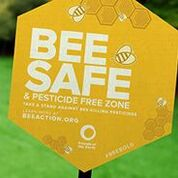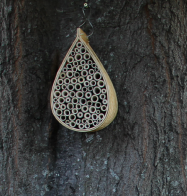As a gardener, I’m very concerned about bees. Anyone who’s ever been stung by a bee may think that’s strange and curse these insects, thinking all they do is sting, buzz, and create a general nuisance. But in reality, bees are essential for 2/3 of our food supply! Without pollination, plants won’t produce and there will be a huge food shortage. Talk about bee-ing misunderstood!
Bees are dying at alarming rates, and neonic pesticides are a key contributor to the problem based on a strong and growing body of science:
- Beekeepers have lost an average of 30% of their hives in recent years, with some beekeepers losing all of their hives and many leaving the industry. This is too high to be sustainable.
- Recent losses are staggering making it difficult for beekeepers to stay in business and for farmers to meet their pollination needs for important crops like almonds and berries.
- A growing body of science implicates neonic pesticides – one of the most widely used class of insecticides in the world, manufactured by Bayer and Syngenta – as a key factor in recent bee die-offs.
- Neonics can kill bees outright and make them more vulnerable to pests, pathogens and other stressors while impair their foraging and feeding abilities, reproduction and memory.
- Neonics are widely used in the U.S. on 140 crops and for cosmetic use in gardens. Neonics can last in soil, water and the environment for months to years to come.
- Neonics are also harming other helpful insects and animals critical to sustainable food production and healthy ecosystems, like wild bees, butterflies, dragonflies, lacewings, and ladybugs, birds, earthworms, mammals and aquatic insects.
In the face of mounting evidence, a growing number of responsible retailers have decided to be part of the solution to the bee crisis:
- Home Depot, the world’s largest home improvement store has decided to label plants with neonicotinoids and is working with its suppliers to “find alternative insecticides for protecting live goods and bees.
- Lowe’s, the second largest home improvement retailer in the world, made a public commitment to eliminate neonicotinoid pesticides from its stores including products and plants treated with them, redouble existing integrated pest management practices for suppliers and provide additional material educating customers about pollinator health.
- Whole Foods issued a new product rating system, which identifies pollinator protection as a priority by restricting neonicotinoid pesticides.
As consumers, we can patronize those bee-friendly companies and do more to encourage their health. Friends of the Earth has recently begun their Bee Action Campaign to help educate, engage, and organize to help protect bees and other essential pollinators. They have created these amazing bamboo bee houses.
The bee house is designed to attract mason bees, who are non-stinging super-pollinators. Each mason bee can visit as many as 1,000 blooms everyday, which is 20 times more than a honeybee. I am so excited to have my own bee house now and I encourage everyone else to get one and also to provide ample water.
Another fun thing to do is host a brunch for bees. All folks need to do is snap two pictures of themselves around their brunch table. One with everything pollinated by bees and one without. There are materials including a how-to kit, sample menu, sign, and social media content. It can all be viewed here.



